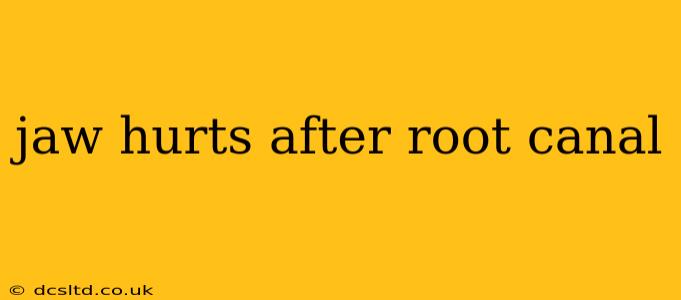A root canal, while designed to alleviate tooth pain, can sometimes leave patients with jaw discomfort afterward. This isn't necessarily a cause for alarm, but understanding the potential causes and how to manage the pain is crucial for a successful recovery. This comprehensive guide will address common concerns and provide helpful advice.
Why Does My Jaw Hurt After a Root Canal?
Jaw pain following a root canal can stem from several factors. It's important to remember that the procedure itself involves significant manipulation of the tooth and surrounding tissues.
- Inflammation: The procedure, while minimally invasive, still causes some inflammation in the gums and surrounding jawbone. This inflammation can cause pressure and pain, particularly in the first few days after the procedure.
- Muscle Strain: The procedure may require you to hold your mouth open for an extended period. This can lead to muscle strain in the jaw, resulting in soreness and stiffness. This is especially true if you experience TMJ (temporomandibular joint) issues.
- Medication Side Effects: Some pain medications prescribed after a root canal can have jaw stiffness or pain as a side effect.
- Infection (Rare): While rare, a persistent or worsening jaw ache could indicate a lingering infection. This is a serious concern and requires immediate attention from your dentist.
- Pre-existing Conditions: Individuals with pre-existing conditions like TMJ disorders may experience heightened jaw pain after a root canal.
How Long Does Jaw Pain After a Root Canal Last?
The duration of jaw pain varies significantly from person to person. For most individuals, the discomfort should subside within a few days to a week. However, if the pain persists or worsens, it's critical to consult your dentist.
Is Jaw Pain After a Root Canal Normal?
Mild to moderate jaw pain after a root canal is considered relatively normal, especially in the immediate aftermath. The discomfort usually diminishes gradually as the inflammation subsides. However, severe, persistent, or worsening pain is not normal and warrants a follow-up appointment.
What Can I Do to Relieve Jaw Pain After a Root Canal?
Several strategies can help manage post-root canal jaw pain:
- Over-the-counter pain relievers: Ibuprofen or acetaminophen can effectively reduce inflammation and pain. Always follow the recommended dosage instructions.
- Ice packs: Applying ice packs to the affected area for 15-20 minutes at a time can help reduce swelling and numb the pain.
- Warm compresses: After the initial 24-48 hours, warm compresses can help relax tense jaw muscles.
- Gentle jaw exercises: Your dentist might recommend gentle jaw stretches to improve mobility and reduce stiffness. Avoid strenuous activities that could exacerbate the pain.
- Soft foods: Stick to soft foods that require minimal chewing to minimize stress on the jaw.
When Should I Call My Dentist About Jaw Pain After a Root Canal?
Contact your dentist immediately if you experience:
- Severe or persistent pain that doesn't respond to over-the-counter pain relievers.
- Increased swelling or redness in the jaw area.
- Fever or other signs of infection.
- Difficulty opening or closing your mouth.
- Numbness or tingling in the jaw or face.
Can a Root Canal Cause TMJ Problems?
While a root canal itself doesn't directly cause TMJ (temporomandibular joint) disorders, it can exacerbate pre-existing conditions. The inflammation and muscle strain associated with the procedure may put additional stress on the TMJ, leading to increased pain and discomfort.
My Jaw Still Hurts a Week After My Root Canal. What Should I Do?
If your jaw pain persists a week after your root canal, contacting your dentist is crucial. Prolonged pain may indicate a complication requiring further evaluation and treatment. Don't hesitate to seek professional help.
This information is for general knowledge and should not be considered medical advice. Always consult your dentist for any concerns regarding your oral health. They can provide a proper diagnosis and recommend the most appropriate course of action for your specific situation.
